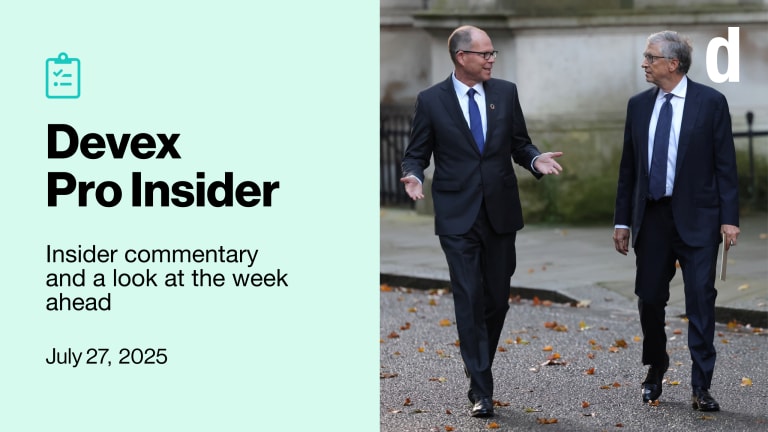Q&A: Priscilla Chan reflects on 4 years leading the Chan Zuckerberg Initiative
"We are still very much in learning mode," Chan tells Devex. The CZI co-founder and co-CEO shares her approach to challenges and her goals for CZI moving forward.
SAN FRANCISCO — The Chan Zuckerberg Initiative last week published its annual letter, reflecting on progress in the nearly four years since Facebook CEO Mark Zuckerberg and his wife, Priscilla Chan, founded the limited liability company. The billionaire couple, who have committed to giving the majority of their wealth to philanthropy through the Giving Pledge, provided updates from the past year, including new leaders who have joined the team. “As someone who was previously a ‘sole practitioner’ as a pediatrician, building our organization from the ground up has been a challenge that keeps me learning every day.” --— Priscilla Chan, co-founder and co-CEO, CZI Chan, co-founder and co-CEO of CZI, expanded on her learnings so far and her goals moving forward in an email interview with Devex. This conversation has been edited for length and clarity. What challenges have you encountered at CZI, and how have you and the team overcome them? CZI was really born of a challenge that Mark and I posed to ourselves when waiting for our first daughter Max’s arrival: “Why can’t we point the promise of new technology toward the challenges that will shape the future for our kids? Is there a way to help gather some of the best thinkers of our time — the brightest engineers and technologists — and get them working on the biggest challenges we face?” To that end, I am excited that CZI is making big, ambitious, and long-range bets in three areas: science, education, and justice and opportunity. Our approach is different from many philanthropies, in that we’re pairing engineering with grant-making, impact investing, policy work, and movement building to dramatically accelerate the pace of progress. We want to help create a future for everyone and help all people reach their full potential. We are learning a lot as we go — that’s something we anticipated and one of the reasons we started our philanthropy early in our respective careers. I believe our commitment to learning and improving over time is an important part of our work. Can you talk about problem-solving approaches at CZI and what lessons they might offer other organizations working to tackle similar challenges? One of our key approaches is actually to deliberately bring people together from very different perspectives, disciplines, and backgrounds in order to make progress on the toughest issues we face — from supporting patient-led advocacy to find cures, to building tech tools that empower teachers to reach each kid in their classroom, to backing training and advocacy efforts to give those in prison a fair shot at a second chance. We have some pretty interesting bodies of work that reflect the diversity of perspectives that drive much of this work. In the advocacy space in particular — and the issues we work on there, including housing and criminal justice reform — we feel strongly that in order for change to happen, and be durable, we need to drive solutions that are bipartisan. But a big focus for us has been: What does this look like in practice and at scale? As we head into our fourth year here at CZI, we are still very much in learning mode — but we are thinking about this all the time. What has been easier and harder than you expected since launching CZI? I think on the easier side: the willingness of those on the front lines of the biggest challenges across science, or housing, or criminal justice reform to work with us and find ways where we can help fill a niche for them that they might not be able to take on themselves, whether that is technology support for, say, prosecutors’ offices hoping to use data in better ways to make fairer sentencing decisions, or advocacy support for patient-led research groups fighting rare diseases. Harder? I think the complexities of running an entire organization. As someone who was previously a “sole practitioner” as a pediatrician, building our organization from the ground up has been a challenge that keeps me learning every day. How have you tried to influence other philanthropists, either directly or by example? Again, collaboration is a prominent theme for us — diverse groups working together toward a common goal is so much more powerful than any one organization or group going it alone. I encourage everyone at CZI to connect with people working on similar issues but who may bring a very different perspective, or who have entirely different skills or expertise. And we keep a strong focus on us not having the solution — our approach is to partner with those on the front lines and find ways where we can accelerate their progress, via funding, technology, advocacy. With everything we work on — from rare disease to education and criminal justice — we always ask: Who is out there doing the work on the front lines right now, who brings new and different perspectives to the table, and what does this space need to continue doing the work in the long term? And we absolutely learn from other philanthropists in the field — and collaborate with the Ford Foundation, Arnold Foundation, and Bill & Melinda Gates Foundation, among others, on some key projects. For example, we are working with the Gates Foundation on the IDseq project, a free cloud-based tool designed to identify and track disease outbreaks in real time. We’ve partnered with the Gates Foundation to put the power of DNA evidence at the fingertips of more underserved doctors/researchers around the world — from Bangladesh to Ethiopia. Gates has the global health and delivery expertise, and we have the technology piece, so that has been a really fruitful collaboration.
SAN FRANCISCO — The Chan Zuckerberg Initiative last week published its annual letter, reflecting on progress in the nearly four years since Facebook CEO Mark Zuckerberg and his wife, Priscilla Chan, founded the limited liability company.
The billionaire couple, who have committed to giving the majority of their wealth to philanthropy through the Giving Pledge, provided updates from the past year, including new leaders who have joined the team.
Chan, co-founder and co-CEO of CZI, expanded on her learnings so far and her goals moving forward in an email interview with Devex.
This story is forDevex Promembers
Unlock this story now with a 15-day free trial of Devex Pro.
With a Devex Pro subscription you'll get access to deeper analysis and exclusive insights from our reporters and analysts.
Start my free trialRequest a group subscription Printing articles to share with others is a breach of our terms and conditions and copyright policy. Please use the sharing options on the left side of the article. Devex Pro members may share up to 10 articles per month using the Pro share tool ( ).
Catherine Cheney is the Senior Editor for Special Coverage at Devex. She leads the editorial vision of Devex’s news events and editorial coverage of key moments on the global development calendar. Catherine joined Devex as a reporter, focusing on technology and innovation in making progress on the Sustainable Development Goals. Prior to joining Devex, Catherine earned her bachelor’s and master’s degrees from Yale University, and worked as a web producer for POLITICO, a reporter for World Politics Review, and special projects editor at NationSwell. She has reported domestically and internationally for outlets including The Atlantic and the Washington Post. Catherine also works for the Solutions Journalism Network, a non profit organization that supports journalists and news organizations to report on responses to problems.








